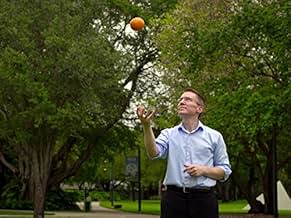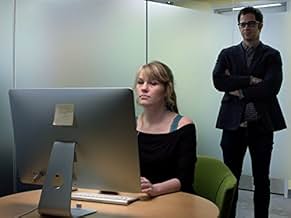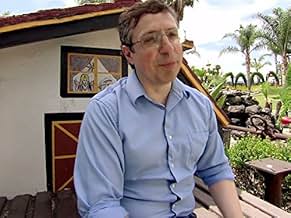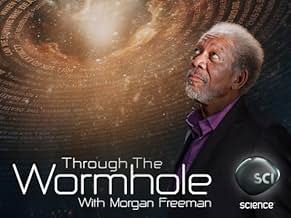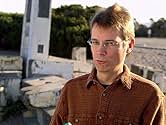IMDb RATING
8.6/10
19K
YOUR RATING
Morgan Freeman explores humanity's biggest questions: our composition, what preceded existence, if we're alone in the universe, and whether there's a creator - mysteries that have challenged... Read allMorgan Freeman explores humanity's biggest questions: our composition, what preceded existence, if we're alone in the universe, and whether there's a creator - mysteries that have challenged our greatest minds.Morgan Freeman explores humanity's biggest questions: our composition, what preceded existence, if we're alone in the universe, and whether there's a creator - mysteries that have challenged our greatest minds.
- Nominated for 2 Primetime Emmys
- 4 nominations total
Browse episodes
Summary
Reviewers say 'Through the Wormhole' is lauded for its exploration of advanced scientific theories and Morgan Freeman's narration. It delves into quantum mechanics, the multiverse, and consciousness. However, critics note a lack of skepticism, blending speculative theories with established science, and occasional pseudoscience. Some find it thought-provoking and educational, while others argue it oversimplifies complex topics and presents misleading information. The series is also critiqued for its approach to religious and philosophical questions, often merging science with spirituality.
Featured reviews
This series is the best that television has ever offered. I watch each part many times to glean as much as I can from it. It is a wonder that a production caters to intellect rather than pandering to the moronic that much television orients its programming at. Morgan Freeman I note is the producer and if that is so, Thank you Mr. Freeman! You are not only a great artist but also a man who takes his responsibility wisely and tries to educate his audience. For those that have missed the Parallels Universe special chapter of this second year, it will make you rethink your entire existence. The approach of this series is to actually interview and then allow the scientists who are top of their field to discuss their research and some of it is boggling in its elegance and mind opening explorations of physics and other scientific implications that are sometimes belied by the chapter titles. There are disagreements between one school of science and scientists and others as after all science is evolving and new evidence changes the implications. Some of the experiments are amazingly simple in principle though surely not easy to actually make them work at the high degree of accuracy required but I would say that a person with a modicum of intellect can understand what is studied and can see why the study or conceptions are so significant. It is a groundbreaking series and anyone with an open mind will be changed forever from the seeing of it as the world is not the way we have imagined it after all..It is even more interesting and thus, so are we.
The fact should be mentioned that other reviews have rated this show less than satisfactory due to highly abstract ideas and very inductive thought processes. While this may be a negativity for other science-based shows, it certainly isn't for 'Through the Wormhole'. As the title suggests, the viewer is traveling through a wormhole - which humankind knows little to nothing of. The producers and scientists behind this don't pretend to know everything. While you don't learn many facts with this show, you do learn theories, laws of physics, and how to expand your thinking. Humans as a species tend to be quite narrow minded, and this can be proved through ongoing problems such as segregation, homophobia and radicalism in religion. While this show doesn't touch much on any of these issues, minds are being re-molded to solve problems nonetheless. There's something about learning of things greater than human lives that, if it can fill even one with a spark, will ignite the future generation of minds.
I used to love this show. It revealed fascinating developments at the forefront of neuroscience, genetics, exobiology, and so forth.
It has degenerated to nearly useless. I shall provide an example drawn from this evening's new episode, "Do We Live in the Matrix?" whereby it is opined--and, ostensibly, justified--that we could very well be living in a computer simulation.
We meet a renowned Swiss AI expert. He tells us there's no need to express pi in so many zillions of digits that wrap around the globe ad infinitum: we can just put "C/d"--where, of course, C is circumference and d is diameter.
Uh . . . the difference is that the first one is practical (I can measure off 3.14159... inches.) The other is purely notational (I cannot measure off C/d inches.)
The same expert tells us that, "I can express the entire universe in ten lines of code," and beams with pride as he presents an extremely vague and general algorithm in an ALGOL-like PDL.
Uh . . . in a suitably high-level language, I can express the entire universe in ONE SYMBOL of code. SO WHAT: what PRACTICAL, IMPLEMENTABLE purpose is accomplished?
Another scientist shows some symmetric matrices to mathematicians without any commentary and is disappointed that they don't get excited. When he builds corresponding models of atomic structures, then everyone's excited.
Perhaps if he had TOLD them they were looking at symmetric spin tensors within a Lie algebra, they would have achieved a meaningful apotheosis. Instead, we hear snippets of some meaningless argument about bits and bytes and shmits.
(I recall from a previous episode--although it's in the same vein--that some physicist claimed that, if he builds such and such a fiber optic circuit, he can go backwards in time by 10 to the -18 seconds. I presume that even a physicist realizes that this is completely unmeasurable and thus unverifiable: sending the data from the measuring device to the managing computer takes literally billions of times longer than the 10 to the -18 seconds putatively recovered. I know, I know, physicists pooh-pooh anything that isn't physics as beneath them, but I don't think that's the issue here.)
I SEE WHAT THE PROBLEM IS HERE: the producers of the show have ZERO understanding of the concepts being discussed, Morgan Freeman's golden throat notwithstanding. This, combined with the PERPETUAL problem that participating experts in TV shows experience, viz., that pieces and snippets of their cogent essays are quoted out of context, results in a stream of meaningless dribble that endeavors to sound technical in its misapplied terminological splendor but ends up delivering just so much imbecility in sheep's clothing, albeit dressy and richly ornamented.
What a PROFOUND disappointment!
(FYI, the popular go-back-in-time theme is utterly impossible. This is trivially easy to demonstrate. Suppose I set a box on my kitchen table and send it into the past. IT WOULD HAVE BEEN THERE YESTERDAY! Case closed.)
It has degenerated to nearly useless. I shall provide an example drawn from this evening's new episode, "Do We Live in the Matrix?" whereby it is opined--and, ostensibly, justified--that we could very well be living in a computer simulation.
We meet a renowned Swiss AI expert. He tells us there's no need to express pi in so many zillions of digits that wrap around the globe ad infinitum: we can just put "C/d"--where, of course, C is circumference and d is diameter.
Uh . . . the difference is that the first one is practical (I can measure off 3.14159... inches.) The other is purely notational (I cannot measure off C/d inches.)
The same expert tells us that, "I can express the entire universe in ten lines of code," and beams with pride as he presents an extremely vague and general algorithm in an ALGOL-like PDL.
Uh . . . in a suitably high-level language, I can express the entire universe in ONE SYMBOL of code. SO WHAT: what PRACTICAL, IMPLEMENTABLE purpose is accomplished?
Another scientist shows some symmetric matrices to mathematicians without any commentary and is disappointed that they don't get excited. When he builds corresponding models of atomic structures, then everyone's excited.
Perhaps if he had TOLD them they were looking at symmetric spin tensors within a Lie algebra, they would have achieved a meaningful apotheosis. Instead, we hear snippets of some meaningless argument about bits and bytes and shmits.
(I recall from a previous episode--although it's in the same vein--that some physicist claimed that, if he builds such and such a fiber optic circuit, he can go backwards in time by 10 to the -18 seconds. I presume that even a physicist realizes that this is completely unmeasurable and thus unverifiable: sending the data from the measuring device to the managing computer takes literally billions of times longer than the 10 to the -18 seconds putatively recovered. I know, I know, physicists pooh-pooh anything that isn't physics as beneath them, but I don't think that's the issue here.)
I SEE WHAT THE PROBLEM IS HERE: the producers of the show have ZERO understanding of the concepts being discussed, Morgan Freeman's golden throat notwithstanding. This, combined with the PERPETUAL problem that participating experts in TV shows experience, viz., that pieces and snippets of their cogent essays are quoted out of context, results in a stream of meaningless dribble that endeavors to sound technical in its misapplied terminological splendor but ends up delivering just so much imbecility in sheep's clothing, albeit dressy and richly ornamented.
What a PROFOUND disappointment!
(FYI, the popular go-back-in-time theme is utterly impossible. This is trivially easy to demonstrate. Suppose I set a box on my kitchen table and send it into the past. IT WOULD HAVE BEEN THERE YESTERDAY! Case closed.)
WOW! I have watched every single episode. FINALLY a high quality scientific show that actually asks high quality questions and goes onto answer them! AMAZING! It has high quality footage, music, and they bring the top experts in whatever field they are discussing. They are not shy to discuss concepts that go beyond the norm and always push the envelope.
Highly recommended if you are bored with the current JUNK that is available. It will broaden your thinking and deepen your perspective on our everyday reality.
Some areas where they can improve is perhaps try not to be TOO neutral! A lot of times they briefly discuss a fantastic idea and not give it enough time to explain further. Thus leaving us with a sense of wanting more information, which i guess is a good thing because then we can go and find out more information on it.
Highly recommended if you are bored with the current JUNK that is available. It will broaden your thinking and deepen your perspective on our everyday reality.
Some areas where they can improve is perhaps try not to be TOO neutral! A lot of times they briefly discuss a fantastic idea and not give it enough time to explain further. Thus leaving us with a sense of wanting more information, which i guess is a good thing because then we can go and find out more information on it.
I have seen both the first and second seasons of this excellent series. It explores topics ranging from eternal life to multiple dimensions, with host Morgan Freeman clearly both interested and knowledgeable in the topic he is discussing. The scientists who appear throughout the show are a mix of the current leaders and some of the up-and-comers in quantum theory and astrophysics.
The common thread running through virtually every episode is the Theory of Quantum Mechanics, and this series will be all the more interesting to you if you have some idea of how modern science works. A Scientific Theory is not a "guess," an "assumption," or a "belief." Theories are based on hard evidence, and are put to the test every day by a world full of scientists who would love to prove one of the big ones wrong. Keep in mind that Gravity is still only a Theory because we can only observe its effects on other things; you still can't see it or directly measure it, even with our high technology.
Quantum mechanics is the dominant theory in modern science because it has been validated by every test thrown at it so far. What this series covers are those many tests and trials, as well as the ideas on the horizon, with each hour long episode dedicated to a particular deep philosophical question. Scientists with competing ideas are allowed to explain their work, and cover many of the new frontiers such as String Theory, Nanotechnology, Multidimensionality, the Multiverse, and even what Consciousness truly is.
Typically science documentaries made in America are not as good as those from the BBC, Europe, or Japan because American shows have to cater to a majority that sadly still fails to accept even evolution. Despite my reservations, Through The Wormhole is bar none the best science documentary series I have seen, as well as the most current in terms of the cutting-edge scientific community.
The production value is very high, with many stunning visual representations of the concepts being discussed. The video is HD and scenes are framed and shot more like a film than a standard television documentary. It even has its own original music rather than stock. They clearly went all out in making this the best it could be.
If you have an open and curious mind I can't think of a better series to recommend. This is a show for people who aren't afraid to ask the big questions, and who are willing to be left with even bigger ones after watching the series. Through the Wormhole will certainly broaden your horizons.
The common thread running through virtually every episode is the Theory of Quantum Mechanics, and this series will be all the more interesting to you if you have some idea of how modern science works. A Scientific Theory is not a "guess," an "assumption," or a "belief." Theories are based on hard evidence, and are put to the test every day by a world full of scientists who would love to prove one of the big ones wrong. Keep in mind that Gravity is still only a Theory because we can only observe its effects on other things; you still can't see it or directly measure it, even with our high technology.
Quantum mechanics is the dominant theory in modern science because it has been validated by every test thrown at it so far. What this series covers are those many tests and trials, as well as the ideas on the horizon, with each hour long episode dedicated to a particular deep philosophical question. Scientists with competing ideas are allowed to explain their work, and cover many of the new frontiers such as String Theory, Nanotechnology, Multidimensionality, the Multiverse, and even what Consciousness truly is.
Typically science documentaries made in America are not as good as those from the BBC, Europe, or Japan because American shows have to cater to a majority that sadly still fails to accept even evolution. Despite my reservations, Through The Wormhole is bar none the best science documentary series I have seen, as well as the most current in terms of the cutting-edge scientific community.
The production value is very high, with many stunning visual representations of the concepts being discussed. The video is HD and scenes are framed and shot more like a film than a standard television documentary. It even has its own original music rather than stock. They clearly went all out in making this the best it could be.
If you have an open and curious mind I can't think of a better series to recommend. This is a show for people who aren't afraid to ask the big questions, and who are willing to be left with even bigger ones after watching the series. Through the Wormhole will certainly broaden your horizons.
Did you know
- ConnectionsFeatured in Symphony of Science: The Quantum World (2011)
- How many seasons does Through the Wormhole have?Powered by Alexa
Details
- Release date
- Country of origin
- Official site
- Language
- Also known as
- Voyage dans l'espace-temps avec Morgan Freeman
- Filming locations
- Ventura, California, USA(Studio)
- Production companies
- See more company credits at IMDbPro
- Runtime1 hour
- Color
- Sound mix
- Aspect ratio
- 16:9 HD
Contribute to this page
Suggest an edit or add missing content






